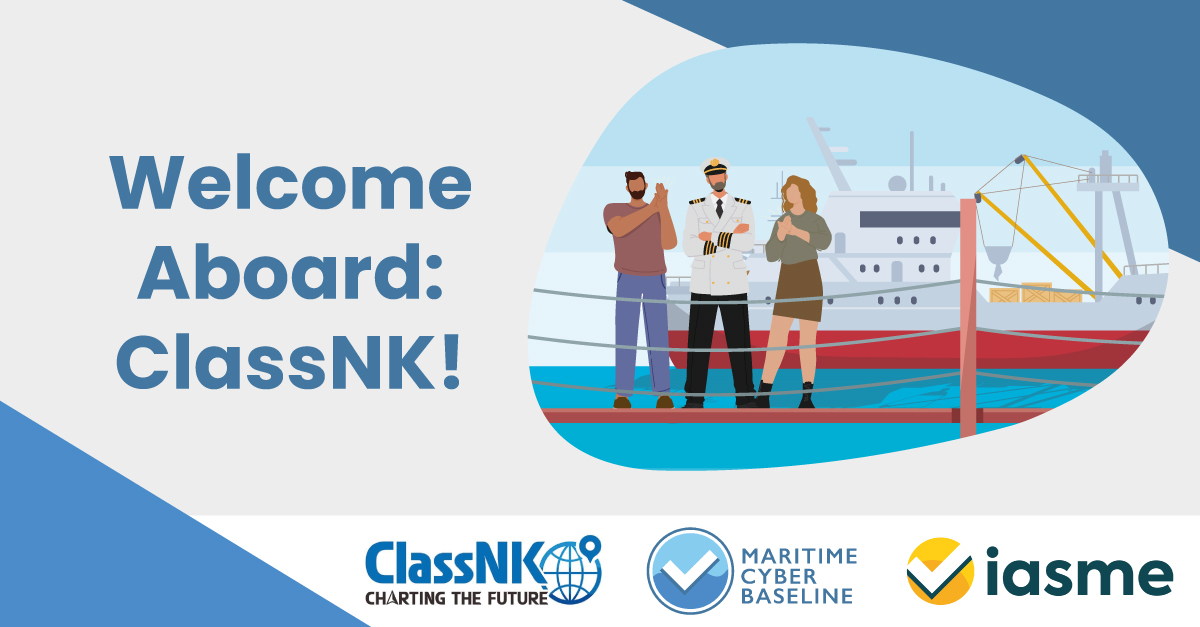We are thrilled to welcome ClassNK (Nippon Kaiji Kyokai), one of the world’s leading ship classification societies, as a newly established Certification Body for the IASME Maritime Cyber Baseline (MCB) scheme. Based in Japan, ClassNK brings decades of expertise in maritime safety, environmental protection, and technical innovation to the forefront of cyber security in the maritime sector.
The Maritime Cyber Baseline scheme is a cyber security certification scheme for vessels of all classifications. It provides a framework to educate and support organisations to understand and implement the essential cyber security controls and processes to reduce the risk of cyber attack occurring. The important cyber security controls outlined in the scheme help vessels take significant steps towards compliance with the cyber requirements set by the IMO, Port Authorities and Classification Authorities.
In a recent conversation with Capt. Naoki Saito, Head of the Cybersecurity Team at ClassNK, and Deputy Manager, Makiko Tani, we explored their journey to becoming an MCB Certification Body and their vision for the future of maritime cyber security.
Why did ClassNK choose the MCB scheme?
ClassNK discovered Maritime Cyber Baseline through their extensive network and ongoing commitment to maritime cyber security. After connecting with IASME and engaging in detailed discussions about the scheme’s structure and alignment with industry needs, ClassNK recognised the MCB as a practical and accessible framework.
Makiko highlighted that one of MCB’s greatest strengths is its clarity and simplicity, particularly in its technical requirements. This makes it an ideal starting point for small and mid-sized shipping companies, many of whom struggle to navigate the complexities of cyber security. By focusing on the most critical attack surfaces, the MCB provides a scalable and achievable entry point for organisations to begin their cyber security journey.
“For many smaller shipping companies, understanding where to start with cyber security can be overwhelming,” Makiko explained. “The MCB framework makes it practical and accessible, offering a clear pathway to begin addressing cyber risks systematically.”
A shared vision for cyber resilience
ClassNK’s decision to join the MCB scheme aligns with their broader mission to enhance safety and resilience across the maritime industry. With approximately 20% of the world’s merchant fleet under their classification, ClassNK is uniquely positioned to drive meaningful change.
Capt. Saito emphasised the importance of collaboration between industry bodies, regulators, and certification schemes. “Too many overlapping schemes can create confusion and burden for shipowners. Collaboration is essential to ensure consistency and to help operators demonstrate that they are managing cyber risks responsibly.”
Looking ahead
As the maritime industry begins to address cyber security more systematically, frameworks like the MCB will play a critical role in raising the baseline of digital resilience. Capt. Saito noted that international regulatory discussions, such as those at the IMO (International Maritime Organisation), are moving toward establishing consistent cyber security guidelines. While international mandatory rules may still be years away, industry-led certifications like the MCB or the ClassNK’s Cyber Security Management System (CSMS) are already helping organisations prepare for the future.
ClassNK’s leadership in the Asia-Pacific region as the first MCB Certification Body in this area is a significant milestone. Their expertise and global reach will undoubtedly help expand the adoption of the MCB scheme, supporting organisations of all sizes in achieving greater cyber resilience.
A Warm Welcome
As risks and challenges grow in a sector increasingly driven by interconnected systems, IASME is proud to collaborate with ClassNK in our shared mission to strengthen cyber security and build a safer, more resilient maritime industry.
For more information about the Maritime Cyber Baseline scheme, contact MCB Certification Manager, Craig Wooldridge [email protected]


